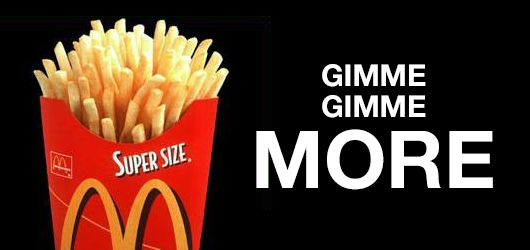
Recently I’ve been wresting with this idea “just because you can, doesn’t mean you should.”
In product development and design, I like to think that we’re always trying to make it simpler, without taking away from the experience … or are we?
When I look at technology today, it seems like we rampantly subscribe to the idea “if you build it, they will come.” Today I read that Facebook has over 350 million users. So I guess in this case, Mark built it, and the people came. But the real question is “do they need it”?
One thing that I find fascinating about technology is the speed of its evolution and the rapid rate at which it allows us to innovate and iterate. We can sketch an idea on a napkin over drinks after work, and then in 48 hours have a live prototype and get feedback from people. But, with this new found freedom of development, comes a certain accountability for the creators.
Our culture has a serious affinity to what could be called an “urge for excess.”
When you survey all the problems that we are facing today, it really comes down to our inability as a society, to exude some self control, restraint, and focus in our lives. We buy things that we don’t need, with money that we don’t have, and then wonder why we are in a financial crisis. We eat things that have little nutritional value, and then wonder why 72% of Americans are obese or overweight. We live in huge houses in the suburbs, commute to work for hours in over-sized vehicles, and then try to understand the cause of our many environmental and climate issues. Yet, at the root of all these issues, is overindulgence and our inability to know what’s truly essential to our lives.
This idea of an “urge for excess” is playing out dramatically in the realm of technology. Experts predict that soon, the information on the Internet will double every 72 hours. According to a recent report by Nielsen, the average person in the US spends 68 hours online each month (that works out to 34 full days online each year). The interesting point the study uncovered is that in a month, an average person visits 2,700 websites, yet only spends 57 seconds at each site. What does this say? People are doing a whole lot of nothing. This is what we do for 34 of our 365 days each year. Are you concerned yet?
So what is needed? What is essential? That is the question that as designers, innovators, technologists, and entrepreneurs, I believe we are most responsible for answering.
To answer this, we need to take time to become students of experience and discover the art of listening, observing, and imagining again. We need to slow down our processes of just “doing” and replace that with the art of asking “why” so we truly identify and understand the problems that map to the solutions we’re creating.
I challenge all designers and creators to bring to life new ideas, not because we can, not because it would be fun to build, not because we talked someone into giving us money for it, but because it would enhance the life of whomever interacts with it and bring meaning value to them.
I challenge you to not create excess but instead create excellence.